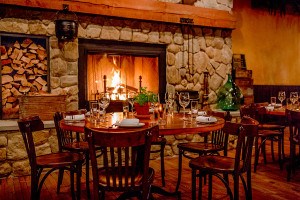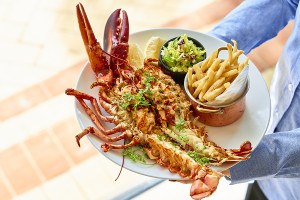What You Missed at Barton Seaver’s New England Aquarium Lecture
Earlier this month, chef-author Barton Seaver spoke at New England Aquarium’s Harborside Learning Lab as part of the aquarium’s spring lecture series. Seaver, who moved to Boston in January “right in time to be walloped by the snow storm,” is the aquarium’s first Sustainability Fellow in Residence. (He’s also the director of the Healthy + Sustainable Food Program at Harvard’s Center for Health & Global Environment, NBD.) Seaver’s lecture focused on his passion for creating a connection between the health of our oceans and the food that ends up on our dinner plates, and it drove home the message that there is a growing need for thoughtful consumers in order to sustain global fisheries. After the thought-provoking lecture, we sat down with Seaver to chat. Here, find a few takeaways from the informative evening.—by Calin Brown
Natural selection dictates our menu options.
Seaver painted a vivid portrait of himself as a young boy spending his summers in a tributary of the Chesapeake Bay. Every morning at the crack of dawn, Seaver would start his own “quest for food,” reaping the bounty from the waters of the river. “My fluency of that bounty, understanding that food was available, was deeply, deeply ingrained in me,” Seaver said. When he was 25 years old and finally given the opportunity to craft his personal menu as an executive chef, Seaver’s immediate response was, “I want bluefish, I want striped bass, I want blue crab, this is going to be fabulous!” Another chef on the line said in response, “What are you talking about, kid? We ate all those. What else do you want?” That was when Seaver realized something about the human relationship with nature. “The guiding hand of natural selection in our world is quite firmly holding a fork,” Seaver said.
Globally, we aren’t doing a good job of sustaining ourselves.
Seaver noted that although the ultimate goal of sustainability seems to be to sustain humans, of course, the fact remains that there are more people in the world not “thriving” than those who are. “80 percent of our global fish stocks are fully exploited, overly exploited or have collapsed. Two billion people rely on the oceans for their primary source of protein,” he said. Seaver then cited some even more alarming statistics. According to the United Nations, by 2025 the demand for seafood is expected to triple. “How are going to feed 7-9 billion people?” Seaver asked.
It’s on us to understand the broader context of our actions.
Seaver remarked when it comes to environmentalism and sustainability, there is little talk about the broader context of particular human actions or human “solutions.” Two examples Seaver cited in his lecture were organic products and recycling, two ideas which have been successfully implemented worldwide, but have failed to achieve defined, significant benefits to the planet. Instead, Seaver says, these band-aid solutions have allowed us to continue our regular consumption without thinking of ways we can actually do things better.
It’s time to make smarter choices about consumption.
Later in an interview, Seaver earnestly repeated the importance of not relying on sustainability in production. “It’s our behavior and how we use that product that produces sustainable usage,” he said. Referring to how we know the science behind managing fisheries more sustainably and have learned to harvest shrimp in a carbon-neutral manner, Seaver continued, “But then you if put them all in an all-you-can-eat shrimp buffet, we fail.”
We can show our support for fisheries with our forks.
Seaver is a huge advocate for the Bristol Bay fisheries in Alaska. Currently, a mining exploration project is planned for the Bristol Bay area in Alaska, a project which, according to recent EPA environmental assessments, will be incredibly damaging to the area. What should our response be? “Vote with your forks,” Seaver said. By consuming Alaskan salmon and other local fish, Seaver stated that the demand for the local fish will let legislators know that Alaskan fisheries and fishermen are important and worthy of being sustained. Unlike the (well-warranted) tales of doom that we often hear about in regard to our ocean’s fisheries, Seaver painted a much more optimistic picture of how there is hope for our oceans. It’s all about choices—and it can all begin with what we put on our dinner table.


